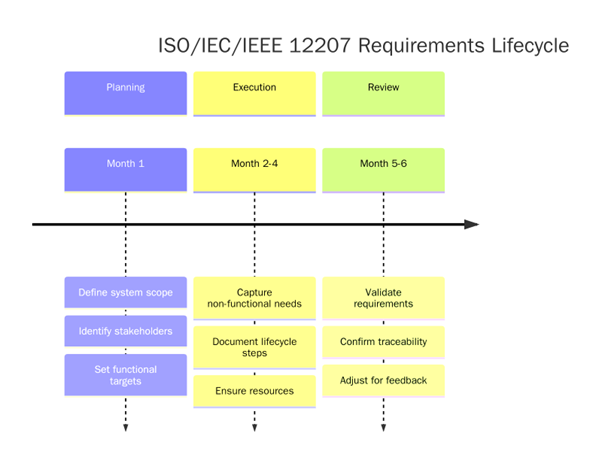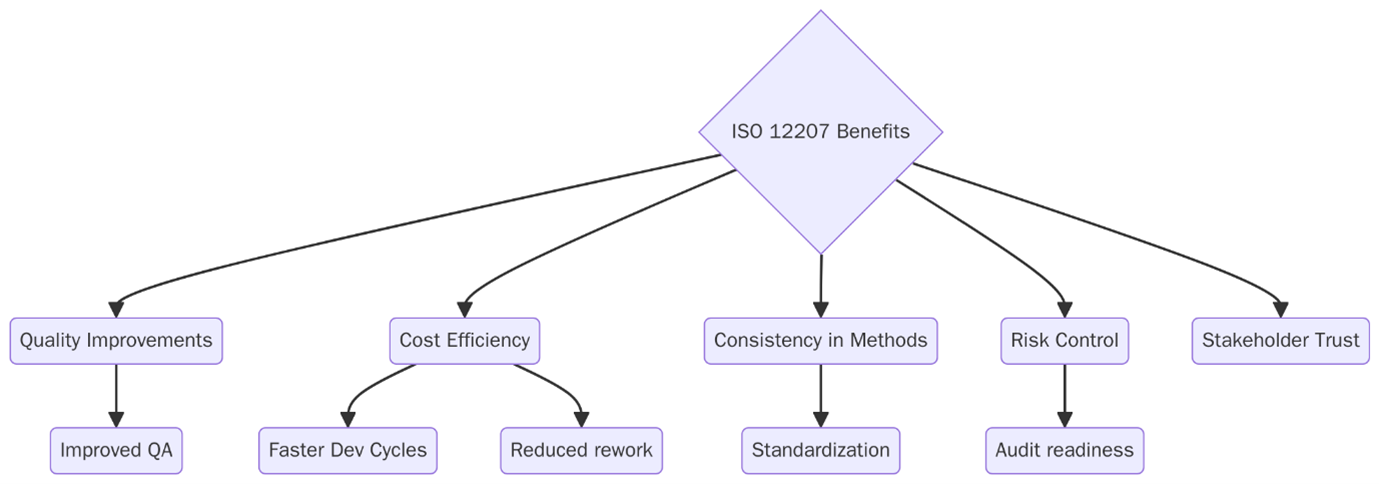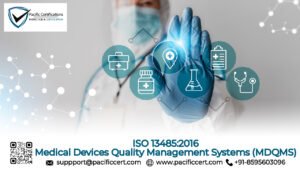What is ISO/IEC/IEEE 12207:2017?

ISO/IEC/IEEE 12207:2017 establishes a common framework for software life cycle processes with well-defined terminology, activities and tasks. It is jointly developed by ISO, IEC, and IEEE, making it one of the most globally accepted standards for software development and management.
This standard covers the entire software lifecycle, from conception through retirement, and defines processes required for acquisition, supply, development, operation, and maintenance of software systems. It is applicable to organizations involved in software-intensive systems, including embedded systems, IT services, and enterprise platforms.
To get expert assistance with ISO/IEC/IEEE 12207 compliance or integration with ISO 9001 and ISO/IEC 27001, contact us at support@pacificcert.com!
Scope and Applicability
ISO/IEC/IEEE 12207 applies to:
- Organizations developing software for internal or external use
- System integrators and suppliers
- Service providers involved in software maintenance and support
- Government and private entities procuring software solutions

It is applicable across domains such as aerospace, defense, automotive, telecommunications, healthcare, finance, and more. The standard facilitates clear communication between stakeholders and ensures consistency in quality and lifecycle management.
Certification Process
ISO/IEC/IEEE 12207 is implemented as part of a broader quality management or software process improvement framework. Organizations often integrate it with:
- ISO 9001 (Quality Management Systems)
- ISO/IEC 27001 (Information Security)
- ISO/IEC 15504 or ISO/IEC 330xx (Software Process Assessment)
The process includes:
- Performing a gap analysis against the standard’s processes
- Mapping current software development practices
- Creating process models and procedural documentation
- Training teams and validating conformance through audits
We support full-cycle implementation and readiness assessments tailored to ISO/IEC/IEEE 12207., contact us at support@pacificcert.com to know more!
How to Implement ISO/IEC/IEEE 12207:2017 in Your Organization
Start by identifying the scope of your software development or maintenance operations. Conduct a baseline assessment to understand current practices against the standard’s framework.
Establish a process architecture that includes:
- Agreement processes (acquisition and supply)
- Organizational project-enabling processes (management, quality, HR)
- Technical management processes (planning, assessment, risk)
- Technical processes (requirements, design, coding, testing, deployment)
Assign responsibilities and train software engineers, testers, project managers, and stakeholders. Monitor performance and conduct regular internal reviews.
If you need help with implementing ISO/IEC/IEEE 12207, please contact us at support@pacificcert.com, our professionals are available 24×7 to help you with the implementation and certification process!
Documentation Required
- Software Development Life Cycle (SDLC) documentation
- Process descriptions and standard operating procedures (SOPs)
- Requirement management and configuration records
- Verification and validation plans
- Risk management and change control records
- Maintenance and operation logs
- Quality assurance checklists and audit reports
These artifacts ensure traceability, compliance, and readiness for assessments. Contact support@pacificcert.com to know more!
Eligibility Criteria
Eligible organizations are:
- Software development firms
- IT service providers and system integrators
- In-house software teams in manufacturing, healthcare, or public sector
- Startups scaling up their software quality management systems
No matter the size or industry, any entity seeking structured software development governance can apply the principles of ISO/IEC/IEEE 12207.
Certification Costs
Cost factors depend on:
- Organization size and software complexity
- Existing maturity of software processes
- Integration with other standards or models
- Required training and documentation development
We recommend beginning with a scope definition and gap assessment to estimate implementation efforts.
For a personalized quote, contact us at support@pacificcert.com today!
Certification Timeline
Week | Key Activities |
Week 1 | Conduct process audit and scope definition |
Week 2 | Develop software process framework and assign responsibilities |
Week 3 | Prepare documentation and map lifecycle tasks |
Week 4 | Deliver training and begin implementation |
Week 5 | Monitor process performance and resolve gaps |
Week 6 | Conduct internal review or prepare for external assessment |
Timelines may vary based on organization size and system complexity, contact us at support@pacificcert.com for your certification roadmap!
Requirements of ISO/IEC/IEEE 12207:2017
Below are the mandatory requirements to be fulfilled the organizations implementing ISO/IEC/IEEE 12207 standard:

- Agreement Processes: Define and manage contracts and supplier agreements
- Organizational Project-Enabling Processes: Cover management, life cycle models, and infrastructure
- Technical Management Processes: Include planning, risk management, decision analysis, and quality assurance
- Technical Processes: Encompass system/software requirements analysis, design, construction, integration, verification, transition, and maintenance
Organizations must ensure these processes are defined, implemented, monitored, and continuously improved.
To know more contact at support@pacificcert.com!
Benefits of ISO/IEC/IEEE 12207:2017
- Consistency in Software Development: Standardizes terminology, tasks, and documentation
- Process Integration: Harmonizes development with quality, security, and project management systems
- Risk Control: Addresses software-related risks early in the lifecycle
- Improved Communication: Aligns expectations between customers, suppliers, and internal teams
- Better Compliance: Supports legal, regulatory, and contract requirements
- Supports Maturity Models: Provides a foundation for adopting CMMI or SPICE

Market Trends and Global Relevance
The software development industry continues to shift toward agile and DevOps models, yet structured process frameworks remain essential in regulated and high-risk domains. ISO/IEC/IEEE 12207 supports hybrid approaches by integrating traditional life cycle models with iterative delivery.
A recent global study by IEEE Software showed that over 10% of medium to large enterprises incorporate elements of ISO/IEC/IEEE 12207 in their internal software development methodologies.
The standard is also referenced in procurement frameworks for government and defense contracts, particularly in the EU, U.S., and Asia-Pacific regions.
Contact support@pacificcert.com to know more!
How Pacific Certifications Can Help
At Pacific Certifications, we support organizations in:
- Performing gap assessments against ISO/IEC/IEEE 12207
- Documenting software processes and lifecycle artifacts
- Training development, QA, and project teams
- Conducting internal reviews and supplier evaluations
- Integrating with ISO 9001, ISO/IEC 27001, and CMMI frameworks
- Certified +150 clients including Adani Defense Group for IT related standards
Whether you’re improving legacy systems or building a scalable software QMS, we provide practical, outcome-focused solutions.
Contact our team at support@pacificcert.com to get started with ISO/IEC/IEEE 12207!
FAQ on ISO/IEC/IEEE 12207:2017
Is ISO/IEC/IEEE 12207 certifiable?
No, but organizations can be assessed for compliance and maturity.
What industries use ISO/IEC/IEEE 12207?
It is used in aerospace, defense, healthcare, automotive, and IT services.
How does it relate to Agile and DevOps?
ISO/IEC/IEEE 12207 can be tailored to support iterative and incremental methods.
Can it be used with ISO/IEC 27001?
Yes, especially when managing secure software development.
Is it mandatory for software suppliers?
Some public procurement contracts mandate adherence or compliance with its principles.
Ready to get ISO 12207:2017 certified?
Contact Pacific Certifications to begin your certification journey today!
Suggested Certifications –








